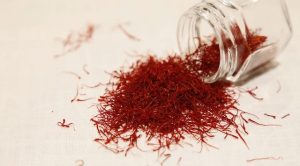In addition to being a yummy spice, saffron has grabbed the interest of scientists because it could be good for our mental health. Let’s dive deeper into this idea.

Thanks to more people becoming aware, depression is now seen as a genuine health problem that needs attention. At times, doctors need to step in to assist with problems like feeling really worried or having trouble sleeping. Apart from that, there are also natural substances that can help make sadness feel better, even though they might not make it go away completely. One of these substances is saffron, which a few specialists and research studies propose can act like a natural mood booster. It can be used alongside regular treatments to help with mild to moderate symptoms of depression.
Is Saffron a Good Mood Booster?
Lots of people experience a problem called depression, which can make them feel really down. Some people prefer to find natural methods to make themselves feel better, and one special spice that’s getting noticed is saffron. Saffron is a bright and red spice that comes from a flower called Crocus sativus. In this section, we’ll discover if saffron can actually help improve our mood, according to what experts have to say.
What is Saffron?
Saffron is a special kind of spice that’s red in color and has a one-of-a-kind flavor. It comes from the tiny parts of the saffron crocus flower. People have been using saffron for a really long time in both traditional medicine and cooking. And guess what? Scientists are now looking into whether saffron might have the power to make us feel happier too!
Can Saffron Help with Mood?
Researchers have explored saffron to determine if it has the ability to enhance our emotions, particularly when we’re feeling sad or low. Saffron contains unique components such as crocin and safranal, which could potentially impact the chemicals in our brain and boost our mood.
What Do the Studies Say?
Research about saffron’s impact on mood has displayed promising results. Yet, it’s essential to bear in mind that further investigation is required. While initial smaller studies indicate that saffron extract could assist in alleviating depression symptoms, it’s necessary to conduct larger studies for more reliable conclusions.
What the Experts Say:
If you’re considering using saffron to improve how you feel, it’s really important to have a chat with doctors or mental health experts before you give it a shot. They can offer you the top advice and figure out if saffron can go along well with the other treatments you might be receiving.
Using Saffron Safely:
Similar to using any natural treatment, it’s important to use saffron correctly and not excessively. Consuming an excessive amount of saffron can be harmful. Additionally, ensure that you obtain saffron of high quality, as low-quality saffron might not provide the desired benefits.
How Saffron Might Help with Feeling Better:
In the earlier part, we learned about how saffron has the power to lift our mood and make us feel happier. Now, let’s delve deeper into how saffron accomplishes this. We’ll uncover the unique components saffron contains and what researchers have currently uncovered.
Special Stuff in Saffron and Our Brain:
Saffron contains unique components such as crocin and safranal, which have positive effects on our brain. These special elements could influence the way our brain’s chemicals, like serotonin (which contributes to our happiness), function.
How Saffron Could Change Our Brain:
The special components found in saffron could assist our brain in adjusting and transforming, which is quite beneficial. This process is termed “neuroplasticity,” and it implies that our brain has the ability to grasp new things and manage stress more effectively. This could be really useful for individuals who are experiencing sadness or depression.
Saffron’s Anti-Inflammatory Side:
Researchers have discovered that saffron might have the ability to decrease inflammation in our brain. Inflammation is closely connected to feelings of depression. Therefore, saffron’s natural anti-inflammatory properties could potentially enhance our mood.
Saffron and Anxiety:
Saffron isn’t only looked at for treating depression. It’s also been researched as a potential remedy for anxiety. Anxiety often goes along with depression, and saffron might be helpful for that as well.
Conclusion:
Saffron has some interesting things in it that might lift our mood. Although initial research shows positive results, further studies are required to confirm these findings. If you’re interested in trying saffron to improve your well-being, it’s important to consult with professionals first and consider it as a supplementary aid alongside your existing treatments.
